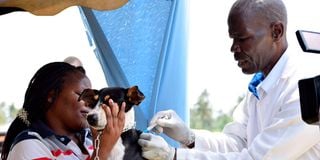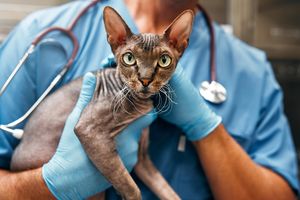Rabies, the silent killer, claims 2,000 lives a year in Kenya

A veterinary officer vaccinates a dog against rabies in Mombasa County.
Rabies, a deadly but preventable disease, is still a major nightmare in Kenya, with authorities and non-governmental organisations calling for more efforts to tackle the 2,000 deaths a year caused by the disease.
Rabies is a viral infection that attacks the central nervous system of mammals, including humans.
Transmitted primarily through the saliva of infected animals, usually through bites or scratches, rabies causes an estimated 59,000 human deaths worldwide each year.
Alarmingly, about 40 percent of those affected are children.
As the world marked Rabies Day on September 28, Kenya was cited as still facing a critical challenge in its fight against the disease.
Rabies claims an estimated 2,000 lives a year in the country, according to the World Organisation for Animal Health (WOAH).
This statistic is exacerbated by a mismatch between vaccine availability and demand.
In some regions, the government provides just 5,000 doses of rabies vaccine for a dog population of 50,000 – a coverage rate of just 10 percent. Experts recommend at least 70 percent for effective disease control.
This shortfall leaves large numbers of dogs unprotected and communities at risk.
Last year, the Ministry of Health sent 60,000 doses of human rabies vaccine to high-risk counties.
Makueni, Machakos, Kitui, Bomet, Nandi, Uasin Gishu, Kisii, Kakamega, Siaya, Kisumu and Migori received 2,000 doses each, Nairobi 3,000 doses and Lamu 1,000 doses.
Dr Patrick Amoth, Director General of Health, said the government is committed to tackling the problem.
"Over the past year, we've seen several mass vaccination campaigns for dogs, including other animals such as cats and donkeys, mainly by county governments as part of their routine disease control programmes," Dr Amoth told the Nation.
“Based on data received through a survey in 2023, there were vaccination campaigns undertaken that led to an estimated 113,000 animals being vaccinated across several counties.”
The Ministry of Health has also taken significant steps to prevent human cases of rabies.
“The ministry, through the National Vaccine & Immunization Program, received 60,000 doses of human anti-rabies vaccines from GAVI. An estimated 50,000 human anti-rabies vaccines were allocated to some counties to supplement what their facilities have,” said Dr Amoth.
Despite these efforts, challenges remain.
Dr Joseph Kipkemoi, Regional Sales Manager for Sub-Saharan Africa East at Boehringer Ingelheim, a global pharmaceutical company, emphasises the critical nature of timely intervention.
“Rabies is nearly always fatal if not given timely treatment. Once clinical symptoms appear, there is no cure. That’s why prevention through vaccination is absolutely critical,” said Dr Kipkemboi.
Domestic dogs are the primary vector for the transmission of rabies to humans, accounting for 99 percent of human rabies cases worldwide.
This makes mass dog vaccination campaigns the most effective strategy for preventing human deaths.
However, Kenya faces several challenges in effectively implementing such campaigns, including limited finances and weak surveillance systems.
To address these issues, Dr Amoth highlighted the collaboration between the Ministry of Health and the Directorate of Veterinary Services through the Zoonotic Disease Unit (ZDU).
“We have been undertaking sensitisation and awareness campaigns to increase knowledge and skills among animal and human health workers on rabies in general and post-exposure management, and also to raise public awareness about the risk of rabies,” Dr Amoth stated.
Kenya has committed to the global “Zero by 30” strategy, which aims to eliminate human deaths from dog-transmitted rabies by 2030.
Dr Amoth highlighted the country's collaboration with international partners.
“Kenya collaborates with the World Health Organization (WHO), World Organization of Animal Health (WOAH), and the Food and Agriculture Organization (FAO) to implement the rabies elimination strategy in all strategic areas.”
Already, Boehringer Ingelheim (BI) has emerged as a key player in Kenya’s fight against rabies through its “Stop Rabies” programme.
In 2023, BI made significant contributions to rabies prevention efforts in Kenya. The company donated 30,000 doses of rabies vaccine for use in vaccination campaigns by Vétérinaires Sans Frontières (VSF) Germany and supported the Mara North Conservancy Dog Project by employing veterinary professionals to provide rabies education to local school children.
BI partnered with local NGOs to deliver 8,000 anti-rabies vaccines using drones in Bungoma and Bomet counties.
This approach not only vaccinated thousands of dogs, but also educated 10,000 people about rabies prevention.
The use of drones to deliver vaccines in hard-to-reach areas demonstrated how technology can be used to improve access to healthcare in rural communities.
“We recognise the critical link between animal health and human well-being. Our goal is to support the agricultural economy by enhancing the health and productivity of animals, while also protecting public health from zoonotic diseases such as rabies,” said Jaisheila Keshav, Head of Animal Health South Africa at BI.
Looking ahead, Dr Amoth outlined future plans:
“We expect to get additional vaccine doses from GAVI that will be distributed to facilities in high-risk counties to be used as post-exposure prophylaxis for members of the public who are exposed to suspected rabid dogs.”
The theme for this year's World Rabies Day was “Breaking rabies boundaries,” which focuses on overcoming barriers to rabies control, such as gaps in disease awareness and inadequate access to resources for prevention and treatment.





